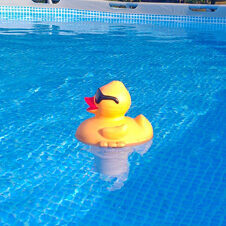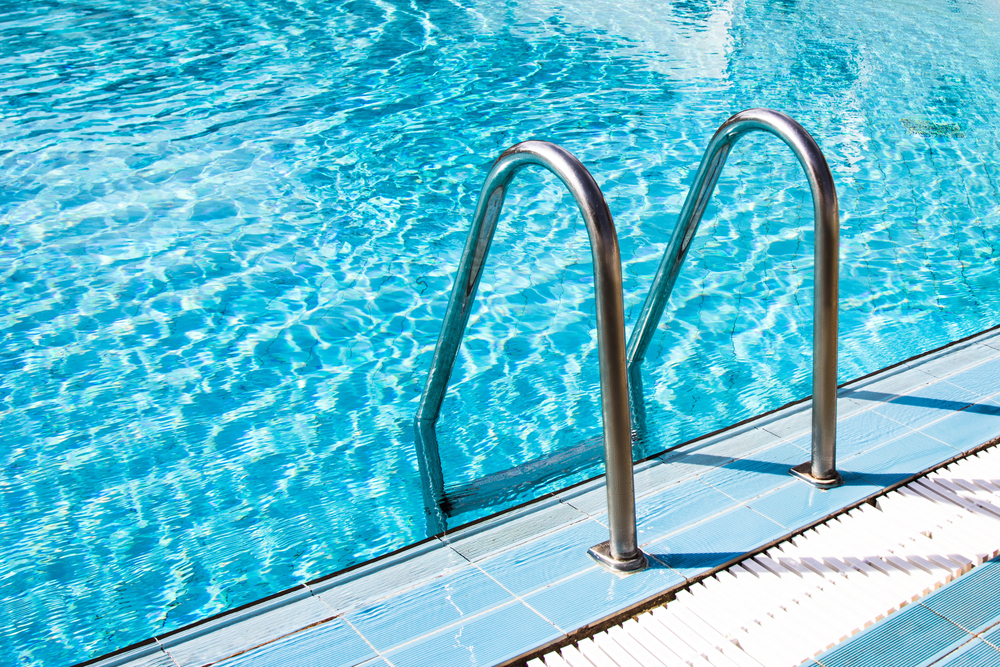Your swimming pool is the perfect place to spend a hot summer’s day.
The sparkling, clear pool water is inviting and provides a place where your friends and family can gather and relax. However, if your pool water is murky, green, or out of balance, the pool can turn from a blessing into something that can make users sick. The big question is, how often should you change the water in your pool?
When Should Pool Water Be Changed?
A good rule of thumb when you are considering changing your swimming pool water is that it needs to be replaced roughly every five to seven years.
This range can go up or down, depending on the pool’s usage. Commercial and public swimming pools need to be changed more frequently, while the pool in your backyard can generally go much longer between changes.
When you change the water in your pool, there are a number of things to consider. The first thing you need to watch for is the weather and aim to change the water when the weather is mild. This ensures that your pool surface is safe from heat and strong sunlight.
Another item to consider is whether you should hire a water hauling service. A water hauling service can take the stress out of changing your pool water.
Factors That Affect Pool Water Chemistry
Even when you are properly caring for and maintaining your swimming pool, the water can still get out of balance and needs to be adjusted.
The water chemistry of your pool changes constantly due to many factors, including environment, toys, and usage. There are five major factors that play a role in your water chemistry.
Chlorine Levels
Chlorine is vital to the balance of your pool water chemistry.
If you have too much chlorine, your pool will have a strong odor, can irritate your skin, and can burn your eyes. If you have too little chlorine, then the alkalinity and pH of your pool will be out of control.
When the alkalinity and pH are out of control, you can experience algae growth and cloudy water. As a rule of thumb, your chlorine levels should be at or below 0.2 ppm, and your free chlorine levels should be between 1 and 3 ppm.
Pool Water Calcium Hardness Levels
The water in your pool has dissolved calcium salts.
The dissolved calcium salts can go up or down depending on debris that has fallen into the pool, chemical reactions from maintaining the pool, and oils/salts on people’s skin.
The goal is to keep the calcium hardness levels between 100 and 400 ppm. If you have too little calcium, you might experience pitting in the plaster walls, while too much calcium will result in scaling and cloudy water.
Total Dissolved Solids
The total dissolved solids, or TDS, of your pool water can’t be avoided.
However, you should shoot to keep this level under 2500 ppm or have the water replaced. It is difficult to chemically balance the water in your pool when the TDS is too high. You also find that the amount of chemicals you will need increases, which isn’t good for you or for the environment.
The total dissolved solids in your pool water can include things like chlorides, algaecide, dirt, debris, and even suntan lotion. Other contaminants can come from tree bark, leaves, pollen, skin chemistry, and much more.
pH Balance
One of the biggest factors in keeping your swimming pool water healthy is its pH balance.
The pH of your water refers to its level of acidity, which can change due to chemicals, free-form contaminants, and algae growth. You want to keep the pH of your pool between 7.2 and 7.8 at all times. This helps to avoid irritated skin and burning eyes and allows for free chlorine use.
Alkalinity
The alkalinity of your pool water is closely connected to your pH balance.
The alkalinity of your pool is the amount of base (hydrogen ions) that are in the water. The alkalinity also lets you know the water’s ability to reduce the loss of and contain hydrogen.
Balancing your alkalinity keeps your pH levels in the optimal range when you add acids or bases to the water. You want to keep your alkalinity between 80-150 ppm.
Extend the Life of Your Pool Water
There are several things you can do to extend the life of your swimming pool’s water.
The first is to ensure healthy water chemistry. The second is to make sure that your pool cover is clean and fits well. The next step is to address seasonal changes.
Spring Prep
When winter ends and temperatures are on the rise, it’s time to prepare for the summer months.
Remove and clean your pool cover and inspect the pool for damage and wear. Next, check your pool equipment and filtration system, test the water chemistry, and prime your pool for use.
This is the perfect time to get a water hauling service to top off your pool and ensure you have perfectly chlorinated, high-quality water for the summer.
Summer Prep
During the summer, frequently test your pool water chemistry and make adjustments as needed.
Prepare for storms and clean out any debris or contaminants that are found. Depending on the weather, you may also need to top off you water level at some point durnig the season.
Fall Prep
Skim the pool regularly as the leaves begin to fall to keep it free from organic debris.
Test and adjust the pH levels of your pool regularly to keep it healthy and clear. Depending on where you live and how cold it gets in the fall, you may need to start prepping your pool for the winter.
Winter Prep
Remember to winterize your pool.
This means lowering your water levels, putting on a winter pool cover, and draining the water from your pipes to prevent freezing and cracking. Periodically check your water chemistry throughout the winter to maintain the water’s pH balance.
Hard Water or Soft Water Makes a Difference
The type of water you use in your pool can also affect how frequently it needs to be replaced.
Hard water naturally contains more minerals, which can build up on the sides and bottom of your pool. This means you need to scrub the walls and vacuum regularly.
However, as a general rule, pools filled with hard water often need to be changed more frequently than those filled with soft water.
Call Taylor's Water Hauling
There are many reasons to use a water hauling service to fill your swimming pool.
Water hauling services are a great way to drain your pool and refill it with clean water. New water is easier to chemically balance and maintain than older water, which may have lots of algae or have become cloudy.
Replacing your pool water can save you money by reducing your chemical load and lessening the strain experienced by your filtration system. The fastest and safest way to refill your pool is with a bulk water delivery from a water delivery service.
A water delivery service puts less strain on your plumbing and water supply. Additionally, a water delivery service will be able to deliver crystal clear, high-quality, locally sourced water that is properly chlorinated and ready to go.
If your pool water is murky, cloudy, or has an unmanageable water chemistry, you need to consider the benefits of having the water changed.
Want To Fill Your Swimming Pool Or Hot Tub Super Fast With Water That Won’t Stain Your Liner?
If you want to quickly fill your hot tub or swimming pool with water that won’t stain your liner with iron deposits—a considerable risk when using well water or plain tap water—you should call Taylor Farms Water Hauling! Contact us online or call our Inwood, West Virginia office directly at 304.229.1194. We service customers like you throughout West Virginia, Maryland, Virginia, and Pennsylvania and can quickly get you and your family in that pool. Let’s help you get the most leisure time out of your pool this season!




